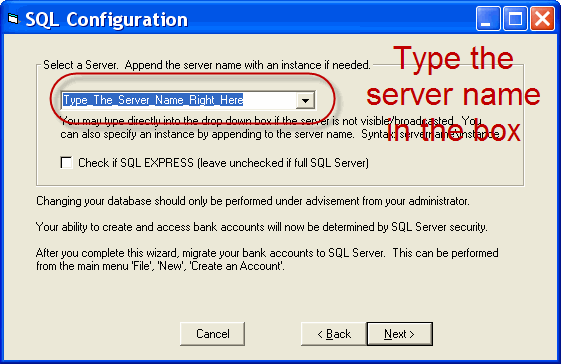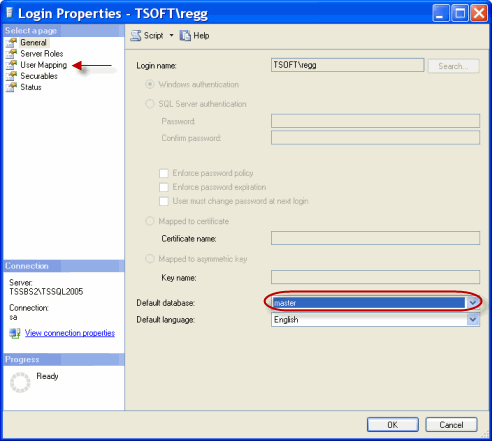SQL Server Installations
"Excellent service. Your customer service representative helped us from setup to transmission. He followed up to make sure everything was working as expected."- FrameCon
Overview
Install the new version of Treasury Software (client) on a workstation
Create databases on the server and test connectivity and security
Rollout - Install the new version of Treasury Software (client)
on production workstations.
Install the new version of Treasury Software (client) on a workstation.
1. Download the new version of Treasury Software from the link below
and save on a network drive.
http://www.treasurysoftware.com/download.aspx
2. Install the software on a workstation (make sure that you have
administrator rights to the computer).
3. Start the software. From the 'Welcome New User' screen, select
the application you are using (ACH, Bank Reconciliation or Positive
Pay).
4. From the main menu select 'File', 'Migrate to SQL'. Point to
the new server and complete the wizard. Exit the software.
Create databases on the server and test connectivity and security
5. Reenter the software. Upon reentry, you will receive multiple
prompts:
· Congratulations - Click OK
· Welcome New User Screen - Click on the same application
as before (ACH, Positive Pay, Bank Reconciliation)
· Congratulations (a second time) - Click OK
· Welcome Create Accounts - Yes
· The 'Create New Account' wizard will start. Leave the 'Create'
option box as the selection.
· Enter your SQL Administrator level identification.
· Enter the name of an account - not 'Sample' (this will
be created afterwards).
· Create Sample Account? - Click 'Yes' (you must create the
sample account)
6. Enter into SQL Server Management Studio.
Each newly created database will have a role/group called 'BankRecPosPayUsers'.
Select Security (at the server level, not below a database). Select
'Login'. Confirm the existence or create new Login ID's for each
of your users. To add a login, right click on 'Login' and select
'New Login'.
Once you have created a login, you need to associate the login with
the role 'BankRecPosPayUsers' for each database. Don't forget to
grant access to the 'Sample' database. There are two approaches
to this:
--Individual
Enter into each database and drill down to Security. Select 'User'
and then add the role to the user's permissions, or select the role
and add this user as a member to the role.
or
--Global (SQL 2005 and above) - Click on Security at the Server
level (not within an individual database), then 'Logins'. Select
and right click a login to edit it's properties. Select 'User Mapping'
from the far left of the Login Properties window. Here you can add
the user to the role for multiple databases with a simple checkbox.
7. Create additional accounts as needed
Start Treasury Software and enter into an account. From the main
menu select File > New Account > 'Create' (you will need to
select the option button) and follow the wizard.
If you are using multiple applications (i.e. ACH Universal and Bank
Reconciliation) make sure to create a separate account for each
application. From within each account select from the main menu
File > Programs and select the application that will be running
in each (ACH Universal, Bank Reconciliation or Positive Pay).
Rollout - Install the new version of Treasury Software (client)
on production workstations.
Repeat the steps below for each client workstation which needs software
8. Repeat steps 2, 3 and 4 on each workstation.
Note: If you are using SQL Server Authentication (as opposed to
Windows Authentication), don't forget to enter the user's SQL Server
ID and password here.
9. Add the accounts to each workstation's catalog, as appropriate.
From the main menu select 'File', 'New Account', 'Add an Existing
Account'. Select the accounts that the user should be able to see
on his list of accounts.
10. Enter license and custom codes.
License - From the main menu select 'File', 'Enter License Codes'.
Enter the codes and click 'Register'.
Custom codes (if applicable) - From the main menu select 'File',
'Options', 'General', 'Custom' tab.
Note: License codes and Workstation codes (bottom part of Custom
tab) - need to be entered at each workstation.
Tips:
The #1 issue in any upgrade is security.
--Make sure that you have a system administrator login ID before
starting
--Create/arrange for logins for all users
--Confirm that the BankRecPosPayUser group has been granted rights
to each database
and
--don't rollout to the users until you have fully tested the new
system.
If you are migrating or upgrading a system and need to identify
the user's SQL Server ID (step #7 above) - from within Treasury
Software enter into an account. Then from the main menu select File
> Maintenance > SQL tab. The User ID will be listed for that
workstation. Note: If there is no User ID listed, then the workstation
is being authenticated by Windows.
For future new employees - when setting up a new workstation - make
sure you use the same version of software that is on the other workstations.
Congratulations!
Can't find your server listed when migrating?
Doesn't mean you can't connect. Type the server name in, such as
MainSQL
If there's a named instance (Accounting) , don't forget that:
MainSQL\Accounting

I found the server, but I can't connect.
If using Windows Authentication, make sure that there is a login
ID for the user.
If using SQL Server security, confirm your ID and password.
Also make sure that the login ID has the default database set to
'Master'. Note: If 'Master' is not listed in the drop down box -
click on User Mappings and grant permission to the user for 'Master'.

Any questions? Please call 866 226-5732.
| 




